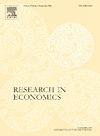Dream killer: Motivations behind illegal migration
IF 1.2
Q3 ECONOMICS
引用次数: 0
Abstract
Illegal migration poses a significant challenge for both sides of the Mediterranean. To understand the motivation behind the intention to migrate illegally from Tunisia, this study, based on a survey conducted by the Arab Barometer in 2021, uses a two-stage Heckman model to control for selection bias and tests different factors such as education levels, social capital, and social networks. The findings show that a lack of education or a low level of education significantly increases the desire to go abroad even without the required documents. This statement is more strongly made by those with relatively low levels of social capital. In addition, social networks were identified as an essential factor in legal migration but do not explain illegal migration.
This study is therefore convinced that investment in education and social capital can be an effective tool in mitigating clandestine migration.
梦想杀手:非法移民背后的动机
非法移民对地中海两岸都构成了重大挑战。为了理解从突尼斯非法移民意图背后的动机,本研究基于阿拉伯晴雨表在2021年进行的一项调查,使用两阶段Heckman模型来控制选择偏差,并测试教育水平、社会资本和社会网络等不同因素。调查结果表明,缺乏教育或教育水平低,即使没有必要的文件,也会大大增加出国的愿望。这种说法在社会资本水平相对较低的人群中更为明显。此外,社交网络被认为是合法移民的一个重要因素,但不能解释非法移民。因此,本研究深信,对教育和社会资本的投资可以成为减少秘密移徙的有效工具。
本文章由计算机程序翻译,如有差异,请以英文原文为准。
求助全文
约1分钟内获得全文
求助全文
来源期刊

Research in Economics
ECONOMICS-
CiteScore
1.40
自引率
0.00%
发文量
37
审稿时长
89 days
期刊介绍:
Established in 1947, Research in Economics is one of the oldest general-interest economics journals in the world and the main one among those based in Italy. The purpose of the journal is to select original theoretical and empirical articles that will have high impact on the debate in the social sciences; since 1947, it has published important research contributions on a wide range of topics. A summary of our editorial policy is this: the editors make a preliminary assessment of whether the results of a paper, if correct, are worth publishing. If so one of the associate editors reviews the paper: from the reviewer we expect to learn if the paper is understandable and coherent and - within reasonable bounds - the results are correct. We believe that long lags in publication and multiple demands for revision simply slow scientific progress. Our goal is to provide you a definitive answer within one month of submission. We give the editors one week to judge the overall contribution and if acceptable send your paper to an associate editor. We expect the associate editor to provide a more detailed evaluation within three weeks so that the editors can make a final decision before the month expires. In the (rare) case of a revision we allow four months and in the case of conditional acceptance we allow two months to submit the final version. In both cases we expect a cover letter explaining how you met the requirements. For conditional acceptance the editors will verify that the requirements were met. In the case of revision the original associate editor will do so. If the revision cannot be at least conditionally accepted it is rejected: there is no second revision.
 求助内容:
求助内容: 应助结果提醒方式:
应助结果提醒方式:


